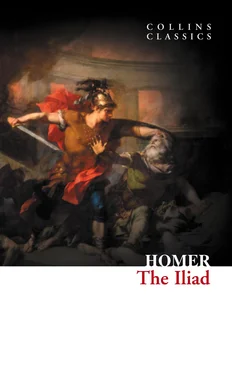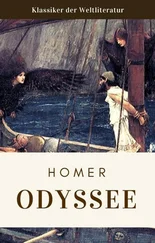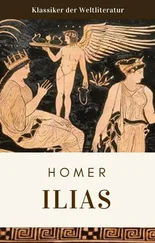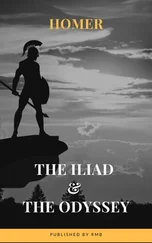This said, the hoary king no longer stay’d,
But on his car the slaughter’d victims laid:
Then seized the reins his gentle steeds to guide,
And drove to Troy, Antenor at his side.
Bold Hector and Ulysses now dispose
The lists of combat, and the ground inclose:
Next to decide, by sacred lots prepare,
Who first shall launch his pointed spear in air.
The people pray with elevated hands,
And words like these are heard through all the bands:
“Immortal Jove, high Heaven’s superior lord,
On lofty Ida’s holy mount adored!
Whoe’er involved us in this dire debate,
O give that author of the war to fate
And shades eternal! let division cease,
And joyful nations join in leagues of peace.”
With eyes averted Hector hastes to turn
The lots of fight and shakes the brazen urn.
Then, Paris, thine leap’d forth; by fatal chance
Ordain’d the first to whirl the weighty lance.
Both armies sat the combat to survey.
Beside each chief his azure armour lay,
And round the lists the generous coursers neigh.
The beauteous warrior now arrays for fight,
In gilded arms magnificently bright:
The purple cuishes clasp his thighs around,
With flowers adorn’d, with silver buckles bound:
Lycaon’s corslet his fair body dress’d,
Braced in and fitted to his softer breast;
A radiant baldric, o’er his shoulder tied,
Sustain’d the sword that glitter’d at his side:
His youthful face a polish’d helm o’erspread;
The waving horse-hair nodded on his head:
His figured shield, a shining orb, he takes,
And in his hand a pointed javelin shakes.
With equal speed and fired by equal charms,
The Spartan hero sheathes his limbs in arms.
Now round the lists the admiring armies stand,
With javelins fix’d, the Greek and Trojan band.
Amidst the dreadful vale, the chiefs advance,
All pale with rage, and shake the threatening lance.
The Trojan first his shining javelin threw;
Full on Atrides’ ringing shield it flew,
Nor pierced the brazen orb, but with a bound
Leap’d from the buckler, blunted, on the ground.
Atrides then his massy lance prepares,
In act to throw, but first prefers his prayers:
“Give me, great Jove! to punish lawless lust,
And lay the Trojan gasping in the dust:
Destroy the aggressor, aid my righteous cause,
Avenge the breach of hospitable laws!
Let this example future times reclaim,
And guard from wrong fair friendship’s holy name.”
Be said, and poised in air the javelin sent,
Through Paris’ shield the forceful weapon went,
His corslet pierces, and his garment rends,
And glancing downward, near his flank descends.
The wary Trojan, bending from the blow,
Eludes the death, and disappoints his foe:
But fierce Atrides waved his sword, and strook
Full on his casque: the crested helmet shook;
The brittle steel, unfaithful to his hand,
Broke short: the fragments glitter’d on the sand.
The raging warrior to the spacious skies
Raised his upbraiding voice and angry eyes:
“Then is it vain in Jove himself to trust?
And is it thus the gods assist the just?
When crimes provoke us, Heaven success denies;
The dart falls harmless, and the falchion flies.”
Furious he said, and towards the Grecian crew
(Seized by the crest) the unhappy warrior drew;
Struggling he followed, while the embroider’d thong
That tied his helmet, dragg’d the chief along.
Then had his ruin crown’d Atrides’ joy,
But Venus trembled for the prince of Troy:
Unseen she came, and burst the golden band;
And left an empty helmet in his hand.
The casque, enraged, amidst the Greeks he threw;
The Greeks with smiles the polish’d trophy view.
Then, as once more he lifts the deadly dart,
In thirst of vengeance, at his rival’s heart;
The queen of love her favour’d champion shrouds
(For gods can all things) in a veil of clouds.
Raised from the field the panting youth she led,
And gently laid him on the bridal bed,
With pleasing sweets his fainting sense renews,
And all the dome perfumes with heavenly dews.
Meantime the brightest of the female kind,
The matchless Helen, o’er the walls reclined;
To her, beset with Trojan beauties, came,
In borrow’d form, the laughter-loving dame.
(She seem’d an ancient maid, well-skill’d to cull
The snowy fleece, and wind the twisted wool.)
The goddess softly shook her silken vest,
That shed perfumes, and whispering thus address’d:
“Haste, happy nymph! for thee thy Paris calls,
Safe from the fight, in yonder lofty walls,
Fair as a god; with odours round him spread,
He lies, and waits thee on the well-known bed;
Not like a warrior parted from the foe,
But some gay dancer in the public show.”
She spoke, and Helen’s secret soul was moved;
She scorn’d the champion, but the man she loved.
Fair Venus’ neck, her eyes that sparkled fire,
And breast, reveal’d the queen of soft desire.
Struck with her presence, straight the lively red
Forsook her cheek; and trembling, thus she said:
“Then is it still thy pleasure to deceive?
And woman’s frailty always to believe!
Say, to new nations must I cross the main,
Or carry wars to some soft Asian plain?
For whom must Helen break her second vow?
What other Paris is thy darling now?
Left to Atrides, (victor in the strife,)
An odious conquest and a captive wife,
Hence let me sail; and if thy Paris bear
My absence ill, let Venus ease his care.
A handmaid goddess at his side to wait,
Renounce the glories of thy heavenly state,
Be fix’d for ever to the Trojan shore,
His spouse, or slave; and mount the skies no more.
For me, to lawless love no longer led,
I scorn the coward, and detest his bed;
Else should I merit everlasting shame,
And keen reproach, from every Phrygian dame:
Ill suits it now the joys of love to know,
Too deep my anguish, and too wild my woe.”
Then thus incensed, the Paphian queen replies:
“Obey the power from whom thy glories rise:
Should Venus leave thee, every charm must fly,
Fade from thy cheek, and languish in thy eye.
Cease to provoke me, lest I make thee more
The world’s aversion, than their love before;
Now the bright prize for which mankind engage,
Than, the sad victim, of the public rage.”
At this, the fairest of her sex obey’d,
And veil’d her blushes in a silken shade;
Unseen, and silent, from the train she moves,
Led by the goddess of the Smiles and Loves.
Arrived, and enter’d at the palace gate,
The maids officious round their mistress wait;
Then, all dispersing, various tasks attend;
The queen and goddess to the prince ascend.
Full in her Paris’ sight, the queen of love
Had placed the beauteous progeny of Jove;
Where, as he view’d her charms, she turn’d away
Her glowing eyes, and thus began to say:
“Is this the chief, who, lost to sense of shame,
Late fled the field, and yet survives his fame?
O hadst thou died beneath the righteous sword
Of that brave man whom once I call’d my lord!
The boaster Paris oft desired the day
With Sparta’s king to meet in single fray:
Go now, once more thy rival’s rage excite,
Provoke Atrides, and renew the fight:
Yet Helen bids thee stay, lest thou unskill’d
Shouldst fall an easy conquest on the field.”
Читать дальше












